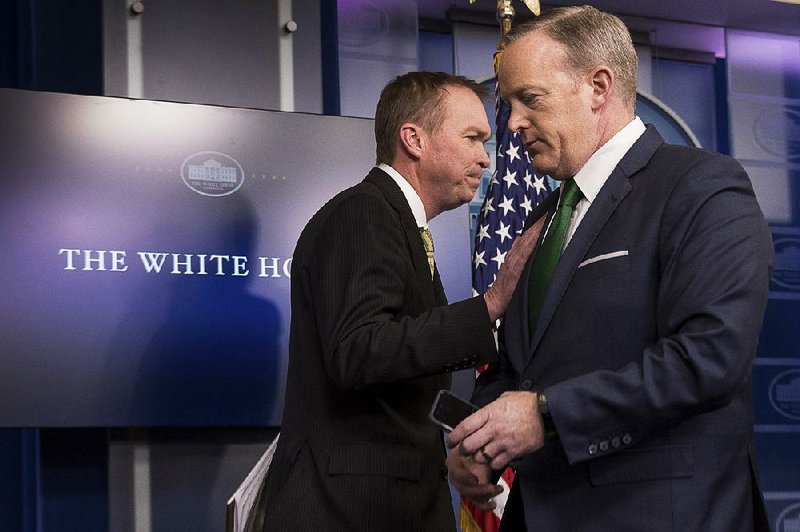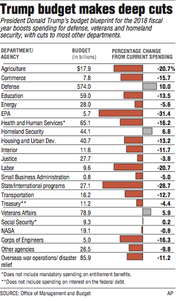WASHINGTON -- President Donald Trump unveiled a $1.15 trillion budget Thursday, proposing a far-reaching overhaul of federal spending that would slash many domestic programs to finance a big increase for the military and make a down payment on a U.S.-Mexico border wall.
The president's initial budget proposal, submitted to Congress on Thursday, would boost defense spending by $54 billion, the largest increase since Ronald Reagan's military buildup of the 1980s. That means deep cuts elsewhere -- the environment, agriculture, the arts -- but Trump said that's imperative to take on the Islamic State extremist group and others in a dangerous world.
"To keep Americans safe, we have made the tough choices that have been put off for too long," he declared in a statement titled "America First" that accompanied the budget for fiscal 2018, which starts Oct 1.
Trump said he is trying to keep a lid on overall government spending while leaving space to boost military, immigration enforcement, border security, school choice and veterans' programs.
[TRUMP'S BUDGET: Explore proposed cuts, additions by agency]
"It is time to prioritize the security and well being of Americans, and to ask the rest of the world to pay its fair share," Trump wrote.
As White House budget director Mick Mulvaney said, "This is a hard-power budget, not a soft-power budget."
The budget proposal would make a down payment on the U.S.-Mexico border wall, which Trump repeatedly promised that the Mexicans would foot the bill. American taxpayers will, at least for now. Thursday's proposal calls for an immediate $1.4 billion infusion with an additional $2.6 billion planned for the 2018 budget year.
While the budget takes aim at Democratic priorities like housing, community development and the environment, it also would slash GOP priorities, such as aid to rural schools, and it would raise fees on participants in the federal flood insurance program.
[PRESIDENT TRUMP: Timeline, appointments, executive orders + guide to actions in first 100 days]
The budget pursues frequent targets of the GOP, eliminating the National Endowment for the Arts, legal aid for the poor, low-income heating assistance and the AmeriCorps national service program established by President Bill Clinton.
Mulvaney said after-school programs had failed to help children in schools, that housing programs were "not well run," that government health research had suffered "mission creep" and that grants to local communities "don't do any good."
Mulvaney waved aside questions about cuts to the United Nations, saying that they "should come as a surprise to no one who watched the campaign." And he said that the president made no apologies for eliminating the government's efforts to curb climate change.
"We're not spending money on that anymore," Mulvaney told reporters at the White House. "We consider that a waste of your money to go out and do that."
More than 3,000 EPA workers would lose their jobs and programs such as Barack Obama's Clean Power Plan, which would tighten regulations on emissions from power plants seen as contributing to global warming, would be eliminated. Popular EPA grants for state and local drinking and wastewater projects would be preserved, however, even as research into climate change would be eliminated. Meals on Wheels, which delivers food to elderly shut-ins, faces cuts.
Some of the most politically sensitive domestic programs would be spared in the new proposal, including food aid for pregnant women and their children, housing vouchers for the poor, aid for special education and for school districts for the poor, and federal aid to historically black colleges and universities.
But the National Institutes of Health would absorb a $5.8 billion cut despite Trump's talk in a recent address to Congress of finding "cures to the illnesses that have always plagued us." Subsidies for airlines serving rural airports in Trump strongholds would be eliminated. The plan would also shut down some money-losing long-distance Amtrak routes and kill off a popular $500 million-per-year Transportation Investment Generating Economic Recovery grant program for highway projects created by Obama.
Parts of Trump's spending plan for the next fiscal year angered both congressional Democrats and Republicans who will have the final say on it.
Even before the official numbers were released, Sen. Lindsey Graham, R-S.C., declared it "dead on arrival," and Senate Majority Leader Mitch McConnell of Kentucky said he personally opposed it as well.
"It is clear that this budget proposed today cannot pass the Senate," said Senate Armed Services Chairman John McCain, R-Ariz.
Just hours after Trump's plan was released, some Republicans made clear they'll combat individual cuts to programs benefiting their home states.
Midwestern Republicans including Sen. Rob Portman of Ohio were upset by cuts to the Great Lakes Restoration Initiative. And Southern Republicans like Rep. Hal Rogers of Kentucky lashed out at cuts he called "draconian, careless and counterproductive."
One target of the budget is the Appalachian Regional Commission, which helps communities in the region.
GOP grumbling
For Thursday's proposal, Republicans praised the president for beefing up the Pentagon, but they were far less enthusiastic about accepting Trump's recipe for doing so without adding to the nation's $20 trillion debt.
"While we support more funding for our military and defense, we must maintain support for our farmers and ranchers," said North Dakota Republican John Hoeven, blasting a 21 percent cut to the Agriculture Department's budget.
The proposed budget would close numerous county offices that help farmers and rural residents navigate farm subsidy and rural development programs. Rural development and water projects would also bear cuts.
"I just want to make sure that rural America, who was very supportive to Trump, doesn't have to take a disproportionately high cut," said Rep. Robert Aderholt, R-Ala.
Budget director Mulvaney acknowledged that passing the cuts could be an uphill struggle and said the administration would negotiate.
"This is not a take-it-or-leave-it budget," he acknowledged.
Many of Trump's GOP allies on Capitol Hill gave scant praise.
"Congress has the power of the purse," said House Appropriations Committee Chairman Rodney Frelinghuysen of New Jersey.
"I look forward to reviewing this," said House Speaker Paul Ryan of Wisconsin.
Earlier in the day, Ryan issued a statement saying he was "determined to work with the administration to shrink the size of government, grow our economy, secure our borders and ensure our troops have the tools necessary to complete their missions."
He did not address any of the proposed cuts.
Democrats in both chambers said the budget plan will have a disastrous effect on middle-class Americans, with Senate Minority Leader Charles Schumer promising a unified front in his party to "emphatically oppose these cuts."
"The very programs that most help the middle class are those that get clobbered the hardest: investments in infrastructure, education, scientific research that leads to cures for diseases all take big hits," said the New York Democrat.
Democrats are "just scratching their head," Sen. Pat Leahy, D-Vt., Appropriations Committee vice chairman, said on Bloomberg Television. "They can't believe this budget; they can't believe knocking so many people out of programs that they need."
In the Senate, where the party holds just 52 of 100 seats, bipartisan support for cuts will be imperative because it takes 60 votes to move spending bills past opponents' delaying tactics.
Trump's proposal covers only roughly one-fourth of the approximately $4 trillion total federal budget. This is the discretionary portion that Congress passes each year, not addressing taxes, Social Security, Medicare and Medicaid.
Before legislators haggle over Trump's 2018 plan, they need to deal with more than $1.1 trillion in unfinished agency budgets for the current year. A temporary catchall spending bill expires April 28. Senate Democrats have warned of a shutdown if Republicans attach funding for Trump's border wall, a deportation force or a defunding of Planned Parenthood to that spending bill.
Information for this article was contributed by Andrew Taylor of The Associated Press; by Laura Litvan, Steven T. Dennis and Anna Edgerton of Bloomberg News; and by Michael D. Shear and Matt Flegenheimer of The New York Times.
A Section on 03/17/2017
RELATED ARTICLES
http://www.arkansas…">Proposed HUD cutback worries officials in state http://www.arkansas…">Pledged border wall in budget http://www.arkansas…">Trump’s plan guts agency boosting Delta http://www.arkansas…">Budget plan backs air traffic spinoff http://www.arkansas…">Trump budget ends air subsidy


